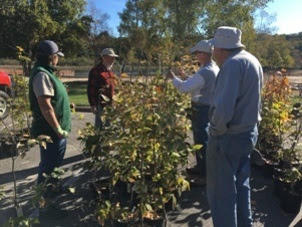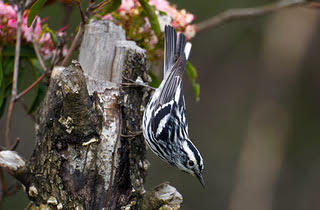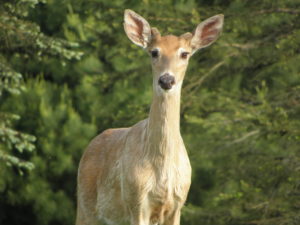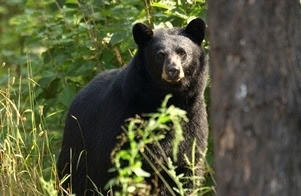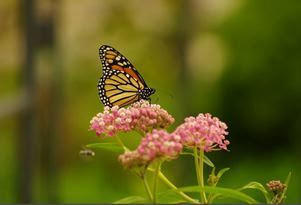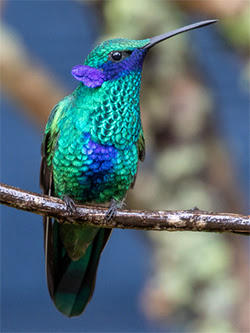By Glen Wunderlich
Ever since my first wild turkey hunt in Michigan back in the ‘70s, the fascination has always evolved into a fair amount of anticipation leading to opening day. As has been the case over the years, I’ve opted for the late season, which runs just about the entire month of May. Much of the mystique of a novice is gone with experience and the advent of television shows featuring turkey hunting. A bit of complacency seems to have set in, however.
Morning finds me outdoors stocking wild bird feeding sites before sun rise, which also offers opportunities to listen for neighboring gobblers. A single trailcam was installed where a portable blind would be placed days before the opener. Only a couple of turkey hens had been spotted – one with a beard

Bearded Hen
– and, that was good enough to assume a Tom would show eventually. However, the afternoon before that first day of the season, I remembered I had yet to sight in my gobbler-getting shotgun. Four shots later it was centered on the target, but my only morning hunt produced one sighting on stand – a lone hen. The Toms have shut down their early morning gobbling from the roosts and seem to have changed routines, but plenty of opportunities remain.
Unseasonably dry weather conditions and lingering cold has put growing conditions behind quite a bit. We needed rain and we finally got a good dose. Predictably, spring finally sprung with wild asparagus and morel mushrooms pushing through the ground cover overnight. While I have no taste for the widely sought-after ‘shrooms, a neighbor didn’t hesitate, when I called to let her know I found a few. Her mesh bag was filled in short order.

Morel Mushrooms
On another note, the spring bird migration has brought in some of my favorite feathered friends to feed. Several Rufous-sided Towhees have become regular freeloaders the past several days and I’m hoping they’ll take up residence instead of moving on like usual. And, another of our most colorful flying spectacles – the Rose-breasted Grosbeak – finally arrived, as well, along with the dazzling Baltimore Orioles. Looks like it’s time to get the grape jelly out for them, too.
Another familiar harbinger of spring is our state bird: the American Robin. Although they are not seed eaters, their antics in search of insects and worms sure can be entertaining. This spring, one has built its nest on top of a security light controlled by a photocell attached to the fixture. The huge nest has totally blocked the electric eye and relegates me to manually operate the light; otherwise it would stay on.
What prompts birds to build nests where they do? Some of their real estate choices are real head-scratchers and that’s where the “Funky Nests in Funky Places” contest comes in. If you find a nest built in a quirky, even downright crazy spot, you may want to share a photo before the June 30th deadline. The contest is hosted by the Celebrate Urban Birds citizen-science project at the Cornell Lab of Ornithology. Entries can be photos, poems, stories, or artwork.
Participants don’t have to be bird or photography experts. All ages are welcome to participate as individuals or with a class, community center, or afterschool program. Entries are being accepted from anywhere in the world. You don’t have to be a participant in the citizen-science project either–just sign in as a guest.
Winners in each category will receive Celestron binoculars and other prizes are available for honorable mentions.
Find more information about how to locate nests, approach them without disturbing the birds, and enter the contest at www.funkynests.org.

